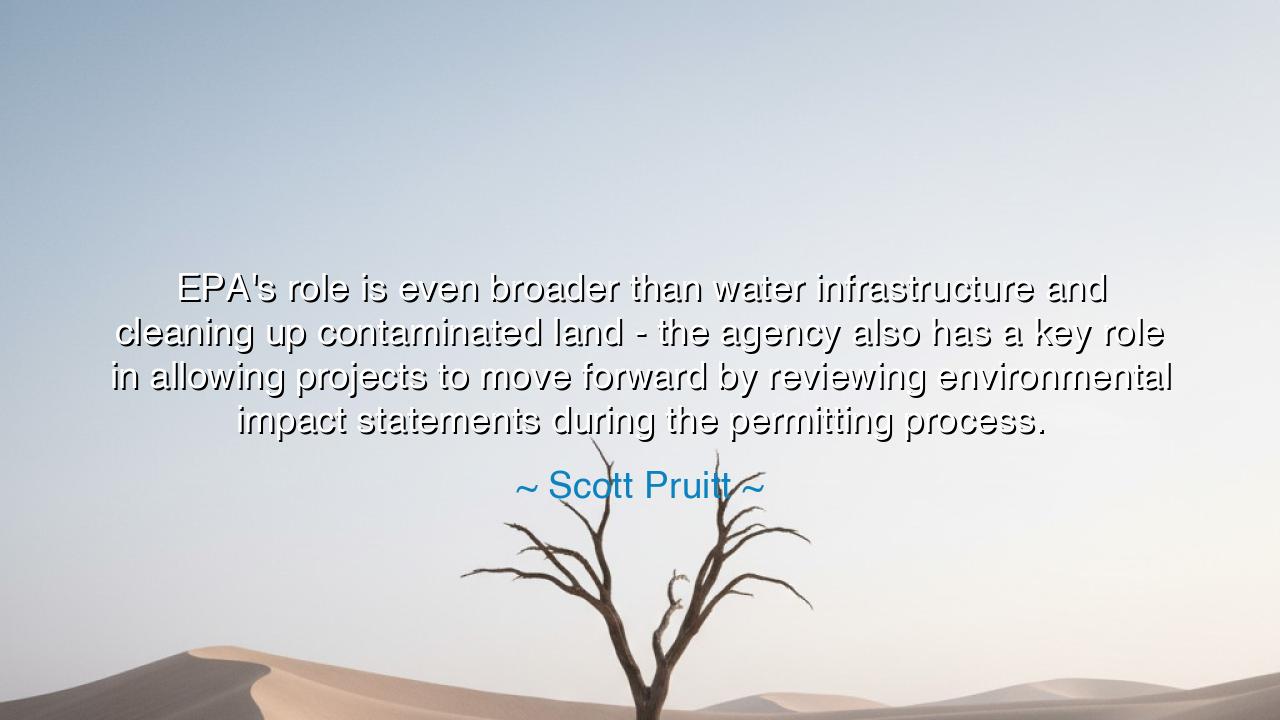
EPA's role is even broader than water infrastructure and cleaning
EPA's role is even broader than water infrastructure and cleaning up contaminated land - the agency also has a key role in allowing projects to move forward by reviewing environmental impact statements during the permitting process.






The words of Scott Pruitt, though spoken in the language of policy, touch upon a truth of great weight: “EPA's role is even broader than water infrastructure and cleaning up contaminated land—the agency also has a key role in allowing projects to move forward by reviewing environmental impact statements during the permitting process.” In this declaration, he reminds us that the work of the Environmental Protection Agency is not only to heal wounds already inflicted upon the land, but also to guard the future, by ensuring that before men build, they first consider the cost their building will place upon the earth. It is a vision not only of repair, but of prevention and foresight.
At the heart of his words lies the recognition that environmental impact is not an afterthought, but a sacred first step. Just as the wise farmer considers the seasons before sowing his seed, and just as the architect studies the soil before raising his temple, so too must a nation consider how its works—its roads, its factories, its towers—will shape the forests, the rivers, and the skies. Pruitt affirms that the EPA is guardian of this foresight, charged with the solemn task of weighing human ambition against the fragile balance of creation.
History gives us grave testimony of what occurs when such foresight is ignored. Recall the Cuyahoga River, which in the 20th century was so polluted with industrial waste that it caught fire, its waters burning like oil. There had been no careful review, no restraint upon ambition, only heedless growth. The flames upon that river shamed a nation into awakening, leading to the very birth of the EPA itself. Thus, Pruitt’s words stand upon the lessons of history: that reviewing environmental impact is not bureaucracy, but the thin line between stewardship and disaster.
His declaration also carries the tension of balance. For he does not speak only of protecting land and water, but of allowing projects to move forward. This is a reminder that the guardian’s role is not merely to forbid, but to guide—to ensure that progress continues without sacrificing the earth. The permitting process becomes not a barrier, but a compass: pointing industry toward ways of building that do not poison, ways of growing that do not destroy. It is a call for harmony, where human ambition and natural preservation walk hand in hand.
Yet, this balance is not easily kept. Too much restriction, and the people cry stagnation; too little restraint, and the land cries out in ruin. This tension is as old as civilization itself. The builders of Babylon raised towers that reached to heaven, but they sowed arrogance that led to scattering. The rulers of ancient China cut forests to fuel their furnaces, yet paid dearly with floods and famine. In every age, the choice has been the same: to build recklessly, or to build with reverence. The EPA’s charge, as Pruitt names it, is to guard that reverence in a modern age.
The lesson for us is clear: progress must be married to responsibility. Roads must be built, cities must expand, energy must flow—but each step must honor the waters, the soil, the creatures, and the people whose lives depend upon them. To demand environmental impact statements is not to hinder the future, but to preserve it, ensuring that what we build today does not become the ruin of tomorrow.
Therefore, children of tomorrow, let these words remind you: whenever you take up a project, whether great or small, first consider its impact upon those around you, upon the earth beneath your feet, and upon those yet unborn. Do not despise the work of review and reflection, for it is the guardian of wisdom. In your life, as in the building of nations, let foresight guide ambition. For only then can your works endure—not as scars upon the land, but as legacies of harmony between mankind and creation.






AAdministratorAdministrator
Welcome, honored guests. Please leave a comment, we will respond soon